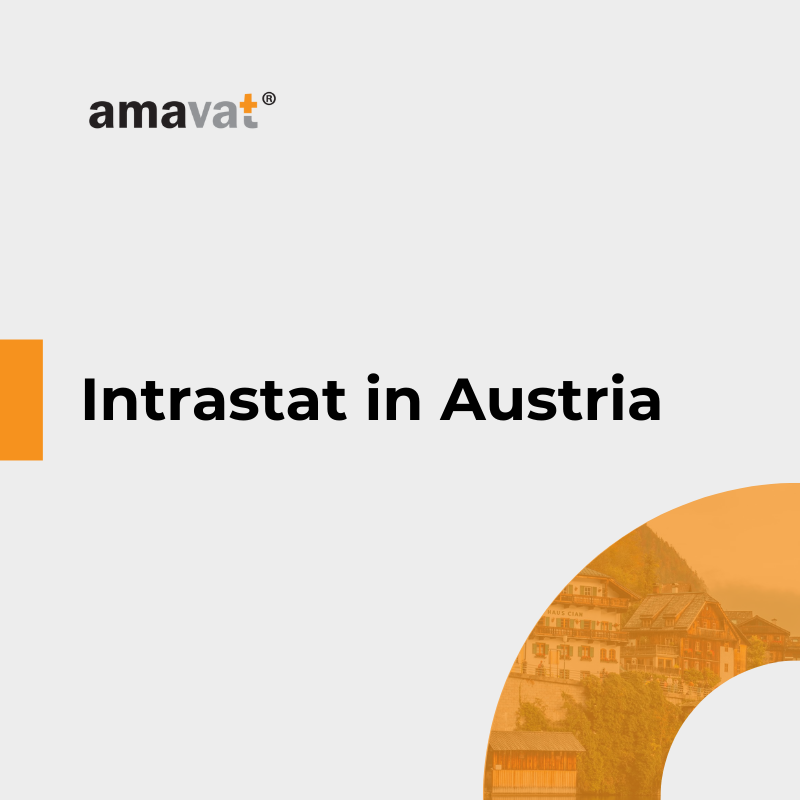Intrastat in Austria: Rules and obligations

Spis treści
Competent authorities
The main authority responsible for the Intrastat system in Austria is the Bundesanstalt Statistik Österreich, located in Vienna. The contact details for the Intrastat offices in Austria are as follows:
- Address: Guglgasse 13, A-1110 Vienna
- Phone: +43 (1) 71128-0
- Fax: +43 (1) 71128-8001
- Email: info@statistik.gv.at (general inquiries), helpdesk@statistik.gv.at (technical inquiries)
- Website: www.statistik.at
Statistics Austria is responsible for collecting, analyzing, and publishing statistical data on foreign trade. Contacting this office is essential for any questions regarding the submission of Intrastat declarations, technical issues, or corrections to declarations.
Reporting periods and deadlines
Intrastat declarations must be submitted monthly, with a deadline of the 10th working day of the month following the reporting period. The Austrian statistical authorities provide a calendar with the submission deadlines, which can be found in the INTRASTAT Guidelines on the Statistik Austria website (see page 51). Adhering to these deadlines is crucial to avoid administrative penalties.
Declaration thresholds
The obligation to submit Intrastat declarations in Austria depends on surpassing specific transaction value thresholds for intra-community trade. Exceeding these thresholds within a year means that businesses must start submitting declarations from the month in which the threshold is reached or exceeded. These thresholds are the same for both imports and exports:
- Basic threshold: €1.1 million
- Detailed threshold: €12 million
Surpassing these thresholds mandates businesses to regularly report their trade transactions. It’s important to note that these thresholds may be adjusted by the authorities, so monitoring current regulations is essential.
Submission method
Intrastat declarations in Austria are submitted electronically using the RTIC (Reporting Tool Intra Collect), integrated with the Statistic Austria portal. RTIC is the only accepted interface for submitting Intrastat declarations. This change in reporting method is due to the European Business Statistics (EBS) regulations, effective across all EU countries from the 2022 reporting year.
Declarations via RTIC must be in .csv, .txt, or .asc file formats. The files must have fixed column assignments for variables, with a maximum of 200,000 reporting lines per data import transaction. For more details about RTIC, the Austrian statistical authorities have published guidelines detailing its functions (the “Reporting Tool Intra Collect (RTIC)” document available on the Statistik Austria website).
To submit declarations, businesses need a username and password, which differ from the credentials used for VAT declarations. This process is straightforward but requires prior registration and obtaining the necessary access rights.
Corrective declaration
If it is necessary to correct data in an Intrastat declaration, this can be done electronically through the Statistik Austria portal using the “R-Ersetztungsmeldung” function. Corrections are required only if the original information was objectively incorrect at the time of submission, such as when the reported goods do not match the actually delivered ones.
Corrective declarations are a critical part of the Intrastat system as they ensure the accuracy and reliability of statistical data. It is important to remember that any correction must be well-documented and justified to avoid potential issues with the statistical authorities.
Penalties for non-compliance
Failure to comply with the obligation to submit Intrastat declarations may result in penalties. If a company does not submit a declaration, it receives a reminder letter (RSb) from Statistik Austria. If the company still fails to comply, the matter is referred to the appropriate municipal or district authorities, which can impose administrative fines for refusing to provide the required information despite multiple reminders.
Penalties can include both fines and other administrative sanctions. In extreme cases, persistent non-compliance can lead to more severe legal consequences. Therefore, it is crucial for companies to be aware of their obligations and submit the required declarations on time.
VAT in Austria
Austria has three main VAT rates. The standard rate is 20%, covering most goods and services. A reduced rate of 13% applies to, among others, domestic air travel tickets, entry to sports and cultural events, and certain agricultural products. Another reduced VAT rate of 10% applies to foodstuffs, books, restaurant services, and social services. There is also a zero rate for international transportation and hotel accommodation services.
For more information on VAT rates in Austria, refer to our article.
Summary
Intrastat in Austria is a critical component of monitoring intra-EU trade. Businesses are required to submit accurate and timely monthly declarations to avoid penalties. The RTIC tool streamlines the entire process, allowing for efficient reporting and data correction. Adhering to the specified deadlines and ensuring the accuracy of the provided information are essential for the proper functioning of the statistical system in Austria. The Intrastat system, with its detailed requirements and strict controls, ensures that trade data is precise and reliable, which is vital for effective economic and trade policy management.
For questions or further information, feel free to contact our team of experts, who are ready to provide assistance and support: Contact us – amavat®.





